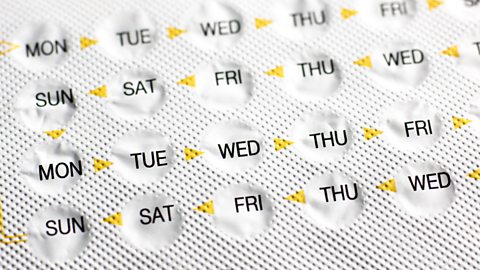Chemical and hormonal methods of contraception
Oral contraceptives

Human fertilityThe ability to reproduce. is controlled by hormoneChemical messenger produced in glands and carried by the blood to specific organs in the body., so fertility can be controlled using hormonal forms of contraception.
The oral contraceptive, which is known as the pill, contains oestrogenA female sex hormone produced in the ovaries, which is responsible for puberty in girls and the regulation of the menstrual cycle. or progesteroneSex hormone produced by the ovaries and placenta. or a combination of both hormones. These hormones inhibit the production of FSHFollicle Stimulating Hormone. It stimulates oestrogen production and the growth of follicles (egg-sacs) in the ovary. It is secreted by the pituitary gland., and eggs cannot mature.
Oestrogen at low levels stimulates the release of eggs. However at high doses, oestrogen will inhibit FSH production. After taking the pill for a while, egg development and release will stop completely. If there is no egg available, there can be no baby. This is why contraceptive pills are so effective.
There are different types of contraceptive pill:
- Oral contraceptive pill – contains a mixture of oestrogen and progesterone that mimics the natural negative feedback effect which prevents the release of FSH and LHLuteinising Hormone, secreted by the pituitary gland, which stimulates ovulation..
- Mini-pill – contains progesterone only and causes thickening of cervical mucus
- Morning after pill – contains a stronger dose of oestrogen and progesterone than the contraceptive pill. It prevents or delays ovulation.
Benefits and risks
| Method | Benefit | Risk |
| Oral contraceptives | More than 99% effective if taken correctly and can reduce the risk of certain cancers | Potential side effects such as changes in weight, mood, and blood pressure due to high levels of oestrogen |
| Contraceptive injections | More than 99% effective | Repeat injections needed every 8-13 weeks before it expires or becomes ineffective |
| Method | Oral contraceptives |
|---|---|
| Benefit | More than 99% effective if taken correctly and can reduce the risk of certain cancers |
| Risk | Potential side effects such as changes in weight, mood, and blood pressure due to high levels of oestrogen |
| Method | Contraceptive injections |
|---|---|
| Benefit | More than 99% effective |
| Risk | Repeat injections needed every 8-13 weeks before it expires or becomes ineffective |